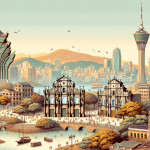Exploring the Hidden Gems of Guinea-Bissau: A Comprehensive Travel Guide
Guinea-Bissau, a small West African country bordered by Senegal to the north, Guinea to the south and east, and the Atlantic Ocean to the west, remains one of the continent’s best-kept secrets. This intriguing nation offers an array of breathtaking landscapes, rich cultural heritage, and unique biodiversity, making it a hidden gem for adventurous travelers. Despite its tumultuous history and underdeveloped tourist infrastructure, Guinea-Bissau promises authentic experiences and unspoiled natural beauty. From the pristine beaches of the Bijagós Archipelago to the vibrant markets of Bissau, the capital city, Guinea-Bissau has something extraordinary for every type of explorer. This comprehensive travel guide aims to reveal the wonders of Guinea-Bissau, providing insights, tips, and essential information to help you plan an unforgettable journey to this remarkable country.
Getting to Know Guinea-Bissau
Understanding Guinea-Bissau’s unique blend of natural beauty, cultural richness, and historical significance is essential for any traveler. Despite its small size, the country is home to a diverse population and offers a wide range of activities and attractions.
A Glimpse into History
Guinea-Bissau’s history is a tapestry of colonization, struggle for independence, and cultural amalgamation. The Portuguese colonized the area in the 15th century, and it remained under Portuguese rule until the mid-20th century. The country’s fight for independence, led by the African Party for the Independence of Guinea and Cape Verde (PAIGC), culminated in 1973. Today, Guinea-Bissau’s history is reflected in its colonial architecture, traditional customs, and resilient spirit.
Cultural Diversity
Guinea-Bissau is a melting pot of ethnic groups, including the Balanta, Fula, Manjaco, Mandinka, and Papel communities. Each group contributes to the country’s rich cultural tapestry, evident in their languages, music, dance, and festivals. Visitors can immerse themselves in local traditions, enjoy vibrant music scenes, and witness unique dances that tell stories of the past.
Natural Beauty
The country’s landscape is characterized by coastal plains, lush forests, and extensive river systems. The Bijagós Archipelago, a UNESCO Biosphere Reserve, is a highlight with its pristine beaches, diverse wildlife, and unique matriarchal society. Inland, the Cantanhez Forest National Park offers opportunities for wildlife spotting and exploring dense forests, while the Orango Islands National Park is known for its saltwater hippos and rich biodiversity.
Top Attractions in Guinea-Bissau
Guinea-Bissau is a treasure trove of attractions waiting to be discovered. Here are some must-visit destinations and experiences:
Bissau
The capital city, Bissau, is a vibrant hub of activity and culture. Wander through the colorful markets, visit the historic Fortaleza de São José da Amura, and explore the National Ethnographic Museum. The city’s colonial architecture and lively atmosphere provide a captivating glimpse into Guinea-Bissau’s past and present.
Bijagós Archipelago
The Bijagós Archipelago is an island paradise consisting of over 80 islands, each with its own unique charm. The islands are renowned for their pristine beaches, crystal-clear waters, and diverse marine life. Visitors can engage in activities such as snorkeling, fishing, and bird-watching. The archipelago is also home to the Bijagós people, who have maintained their traditional way of life over centuries. The Orango Islands National Park, a part of the archipelago, is famous for its rare saltwater hippos and vibrant ecosystem.
Cantanhez Forest National Park
For nature enthusiasts, Cantanhez Forest National Park is a must-visit destination. This protected area is home to a variety of wildlife, including chimpanzees, leopards, and numerous bird species. The park’s lush forests, winding rivers, and scenic landscapes offer countless opportunities for hiking, wildlife photography, and eco-tourism. Guided tours provide insights into the park’s biodiversity and conservation efforts.
Bolama Island
Bolama Island, the former capital of Portuguese Guinea, is steeped in history and charm. The island’s colonial-era architecture, crumbling yet majestic, tells the story of its past. Visitors can explore the old governor’s palace, the abandoned cathedral, and the picturesque streets lined with mango trees. Bolama’s tranquil beaches and laid-back atmosphere make it an ideal spot for relaxation and reflection.
Saltinho Waterfalls
The Saltinho Waterfalls, located near the town of Bafatá, are a natural wonder that should not be missed. The cascading falls create a serene and picturesque setting, perfect for a refreshing swim or a peaceful picnic. The surrounding area is rich in flora and fauna, offering ample opportunities for nature walks and bird-watching.
Travel Tips for Guinea-Bissau
Traveling to Guinea-Bissau requires some preparation and awareness of local customs and conditions. Here are some essential tips to ensure a smooth and enjoyable trip:
Visa and Entry Requirements
Visitors to Guinea-Bissau typically need a visa to enter the country. It’s advisable to check the latest visa requirements and obtain a visa in advance from a Guinea-Bissau embassy or consulate. Some neighboring countries may offer visa-on-arrival options, but it’s best to confirm this before traveling.
Health and Safety
Travelers should take health precautions, including vaccinations for diseases such as yellow fever, typhoid, and hepatitis A and B. Malaria is prevalent in Guinea-Bissau, so taking antimalarial medication and using insect repellent is recommended. It’s also wise to drink bottled or boiled water and avoid raw or undercooked foods to prevent gastrointestinal issues. While Guinea-Bissau is generally safe for tourists, it’s essential to stay informed about local conditions and exercise caution, especially in remote areas.
Transportation
Getting around Guinea-Bissau can be challenging due to limited infrastructure and public transportation options. Taxis and shared minibusses, known as “toca-tocas,” are common modes of transport in urban areas. For exploring remote regions and islands, hiring a private vehicle or arranging guided tours is advisable. Domestic flights and boat services connect some of the major islands in the Bijagós Archipelago.
Language and Communication
Portuguese is the official language of Guinea-Bissau, but Crioulo (a Portuguese-based creole) is widely spoken and understood. Learning a few basic phrases in Portuguese or Crioulo can enhance your travel experience and help you connect with locals. English is not commonly spoken, so having a phrasebook or translation app can be useful.
Currency and Banking
The official currency is the West African CFA franc (XOF). Credit cards are not widely accepted, so it’s essential to carry sufficient cash for your expenses. ATMs are available in major cities, but they may not always be reliable. It’s a good idea to exchange currency at banks or official exchange bureaus upon arrival.
Experiencing the Local Culture
One of the most rewarding aspects of traveling to Guinea-Bissau is immersing yourself in the local culture. Here are some ways to experience the country’s vibrant traditions and customs:
Festivals and Celebrations
Guinea-Bissau hosts a variety of festivals and celebrations throughout the year, showcasing its cultural diversity and heritage. The Carnival of Bissau, held in February or March, is a lively event featuring colorful parades, music, and dance. The Tabaski (Eid al-Adha) festival, celebrated by the Muslim community, involves feasting, prayer, and community gatherings. Attending these events provides a unique insight into the country’s traditions and way of life.
Traditional Music and Dance
Music and dance are integral to Guinea-Bissau’s cultural identity. The country is known for its distinctive genres, such as gumbe and kussunde, which blend African rhythms with Portuguese influences. Local musicians often perform at markets, festivals, and cultural centers. Visitors can also participate in traditional dance workshops to learn the steps and rhythms of Guinea-Bissau’s vibrant dances.
Crafts and Souvenirs
Guinea-Bissau’s artisans create a range of handmade crafts, including textiles, jewelry, pottery, and wood carvings. These items make for meaningful souvenirs and support local communities. Markets and craft shops in Bissau and other towns offer a variety of traditional goods, allowing travelers to take home a piece of Guinea-Bissau’s artistic heritage.
Culinary Delights
Guinea-Bissau’s cuisine is a delightful fusion of African, Portuguese, and Creole influences. Staples include rice, fish, cassava, and palm oil, often seasoned with a variety of spices. Popular dishes include “caldo de peixe” (fish stew), “jollof rice” (a West African rice dish), and “cachupa” (a hearty stew made with corn, beans, and meat or fish). Street food vendors and local restaurants offer an array of delicious and affordable options for travelers to savor the flavors of Guinea-Bissau.
Sustainable Tourism in Guinea-Bissau
As a destination with fragile ecosystems and limited resources, promoting sustainable tourism is crucial in Guinea-Bissau. Travelers can contribute to the preservation of the country’s natural and cultural heritage by following these guidelines:
Respecting Local Communities
Visitors should be mindful of local customs and traditions, showing respect for the people and their way of life. Engaging with communities in a positive and respectful manner fosters mutual understanding and enriches the travel experience. Supporting local businesses, such as family-run guesthouses, restaurants, and craft shops, also helps to boost the local economy.
Conservation and Wildlife Protection
Guinea-Bissau’s diverse ecosystems and wildlife require protection from environmental threats. Travelers should adhere to guidelines set by conservation organizations and national parks, such as staying on designated trails, not disturbing wildlife, and avoiding the use of single-use plastics. Participating in eco-tourism activities, such as guided wildlife tours and community-based conservation projects, can provide valuable support for conservation efforts.
Minimizing Environmental Impact
Reducing your environmental footprint is essential when traveling to Guinea-Bissau. This includes conserving water and energy, disposing of waste responsibly, and choosing eco-friendly accommodation and transportation options. Travelers can also participate in beach clean-ups and other environmental initiatives to help protect Guinea-Bissau’s natural beauty for future generations.
Planning Your Trip to Guinea-Bissau
Proper planning is key to making the most of your visit to Guinea-Bissau. Here are some practical steps to help you prepare for your adventure:
Research and Itinerary
Begin by researching the destinations and activities that interest you the most. Create a flexible itinerary that allows for exploration and relaxation. Consider the best time to visit, taking into account the weather, local events, and any travel advisories.
Accommodation
Accommodation options in Guinea-Bissau range from budget guesthouses to mid-range hotels. Booking in advance is recommended, especially during peak travel seasons. Look for accommodations that are committed to sustainability and community involvement.
Travel Insurance
Purchasing comprehensive travel insurance is essential for any trip. Ensure your policy covers medical emergencies, trip cancellations, and any activities you plan to undertake, such as wildlife tours or water sports.
Packing Essentials
Pack light and bring essentials such as comfortable clothing, sturdy footwear, insect repellent, sunscreen, and a reusable water bottle. Don’t forget important documents like your passport, visa, and travel insurance information. A small first aid kit and any necessary medications are also recommended.
Conclusion
Guinea-Bissau, with its unspoiled landscapes, rich cultural heritage, and welcoming people, offers a unique and rewarding travel experience. While it may not be a conventional tourist destination, its hidden gems and authentic charm make it well worth the journey. By embracing sustainable travel practices and respecting local traditions, visitors can help preserve this remarkable country for future generations. Whether you’re exploring the vibrant streets of Bissau, relaxing on the pristine beaches of the Bijagós Archipelago, or immersing yourself in the local culture, Guinea-Bissau promises an unforgettable adventure that will leave you with lasting memories and a deeper appreciation for this extraordinary corner of West Africa.
For more information on how to plan your trip and discover more about Guinea-Bissau, visit the official tourism website of Guinea-Bissau.








